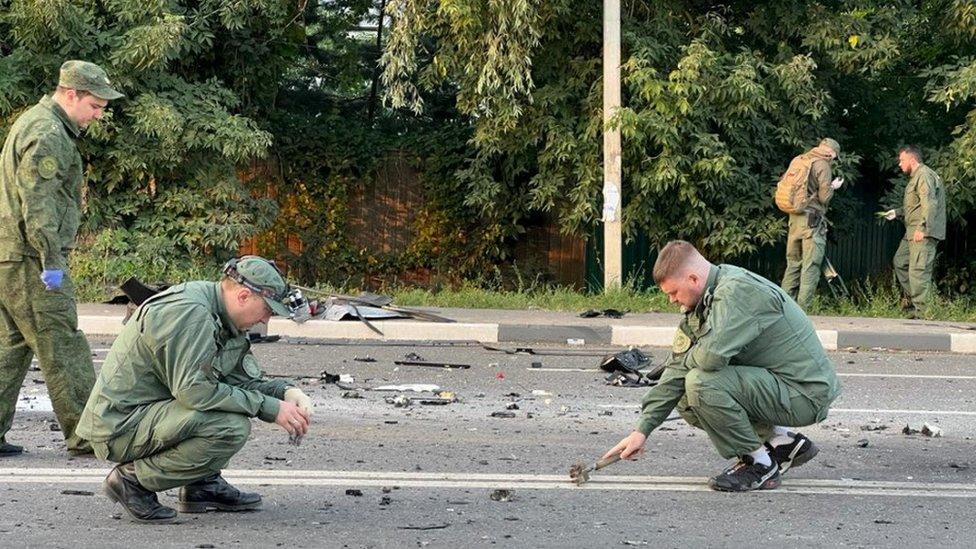Darya Dugina: Ukraine killed Putin ally's daughter, Russia says
- Published
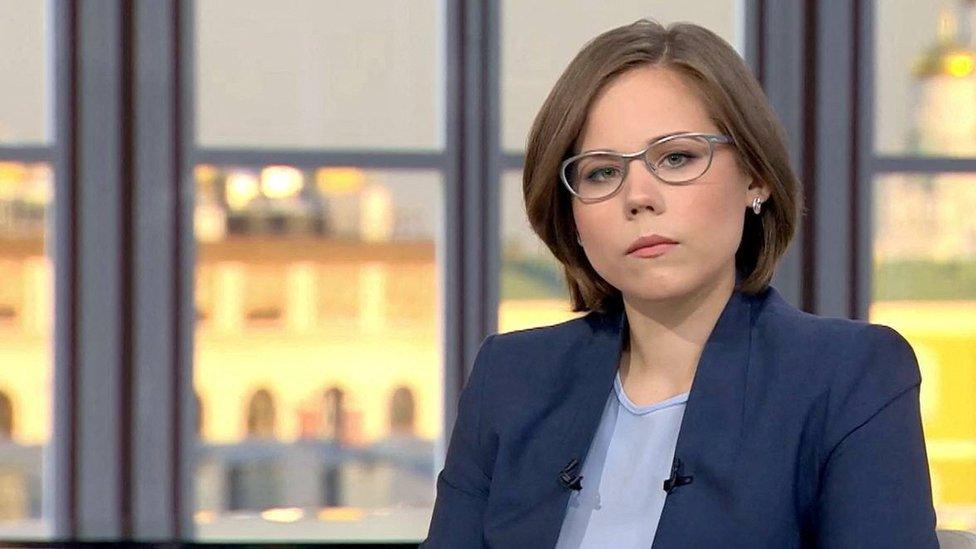
Ms Dugina was a regular guest on Russian television news
Russia has accused Ukrainian special services of killing the daughter of one of President Vladimir Putin's allies in a car bombing at the weekend.
Darya Dugina, aged 29, died on Saturday when a vehicle she was driving exploded near Russia's capital Moscow.
Her prominent ultra-nationalist father, Alexander Dugin, said to be close to Mr Putin, may have been the intended target of the attack.
Ukrainian officials have denied any involvement in the explosion.
But Russia's Federal Security Service (FSB) said on Monday it had solved the case and said that Ukraine was directly responsible.
The FSB told Russian media that a Ukrainian woman had moved to Russia in July alongside her young daughter - but that she was in fact a Ukrainian special services contractor.
The woman, it said, rented an apartment in the same building as Ms Dugina for a month, preparing for the attack. In that time, she allegedly followed Ms Dugina through Moscow in a Mini Cooper - for which she used three different licence plates.
The suspect then escaped to Estonia after the explosion, the FSB said.
An adviser to Ukraine's President Zelensky, Mykhailo Podolyak, said the FSB's version of events was "Russian propaganda" from "a fictional world".
The FSB later released video allegedly showing the suspect's car entering Russia, security footage of her entering what is said to be Ms Dugina's building, and leaving Russia.
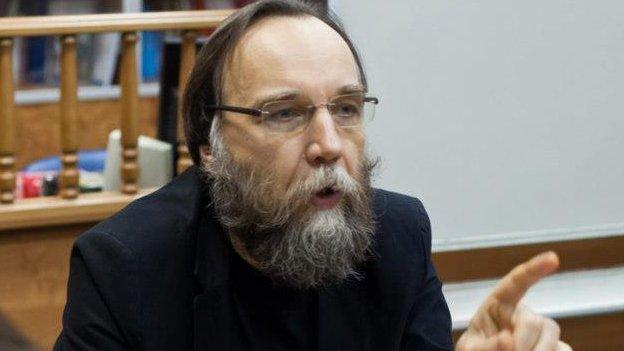
Alexander Dugin is credited with shaping President Vladimir Putin's worldview
Ms Dugina and her father were attending a festival near Moscow on Saturday evening where Mr Dugin, a philosopher, gave a lecture. They had reportedly intended to leave in the same car, but changed their plans at the last minute.
Investigators said explosives had been planted underneath the Toyota Land Cruiser Ms Dugina was driving.
Video from the scene posted online appeared to show a shaken Mr Dugin watching emergency services attend the burning vehicle.
A family friend, Konstantin Malofeev, published a statement on behalf of Mr Dugin which branded his daughter's killing "a terrorist act by the Ukrainian Nazi regime".
He was referencing the unfounded yet oft-repeated claim by Russian leadership of a powerful Nazi presence inside Ukraine - one of the main reasons put forward for Russia's invasion of Ukraine on 24 February.
"My daughter Darya Dugina was brutally murdered in front of me," the statement on Telegram read, external. "She was a beautiful Orthodox woman, patriot, war reporter, an expert for central TV and philosopher."
"We only need our victory. My daughter sacrificed her young woman's life to its altar. So please, achieve it!"
President Putin personally paid tribute to Ms Dugina in a statement from the Kremlin on Monday, and called her death "a vile, cruel crime". He also posthumously awarded Ms Dugina the Order of Courage, praising her "dedication shown in the performance of professional duty".
Ms Dugina was a political commentator for her father's International Eurasian Movement organisation, and wrote regularly for pro-Kremlin media outlets.

Speculation rife in Russia
By Will Vernon, BBC News Moscow
On Monday morning, the Time Will Tell programme on Russian state TV paid tribute to Darya, a regular guest. "She died for the idea of the 'Russian World,'" said presenter Olesya Losyeva.
One studio guest suggested the response would be "holy fury" and the programme showed a photograph of mortar shells, apparently belonging to pro-Russian forces in Ukraine, one of which had "This is for Darya!" scrawled on the side.
If Ms Dugina's killing was meant to intimidate Russia, bellowed several of the guests, "it will have the opposite effect".
Analyst Yekaterina Shulman says the outpouring of anger amongst pro-Kremlin commentators in response to the car bomb attack appears suspicious: "The reaction… was immediate. It looks as if they were waiting for something like this to happen."
Whoever was responsible, says Ms Shulman, the killing "could possibly be used to ramp up some public outrage within the country to justify even more active repressive actions on the part of the state".

Ms Dugina was a vocal supporter of the Russian invasion of Ukraine. She had been placed under sanctions by the UK in July as "a frequent and high-profile contributor of disinformation in relation to Ukraine".
Her father, Alexander, is also known as "Putin's brain" and has long expressed an anti-Western, ultranationalist philosophy that has made him a significant figure in Moscow - despite holding no political office himself.
Seen as the founder of Russia's anti-European movement, he told the BBC in 2014 that war with Ukraine "is inevitable", and had long called for the annexation of Crimea - something which happened that year.
Also that year, a video emerged apparently showing Mr Dugin saying in Russian: "I think, kill, kill and kill [Ukrainians], there can't be any other talk." The comments outraged many Ukrainians.
Related topics
- Published21 August 2022
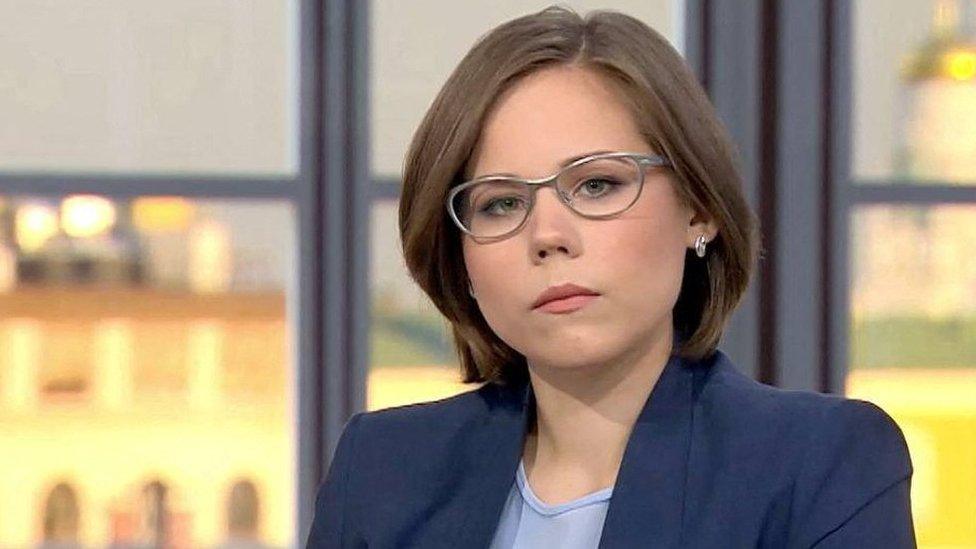
- Published11 March 2015
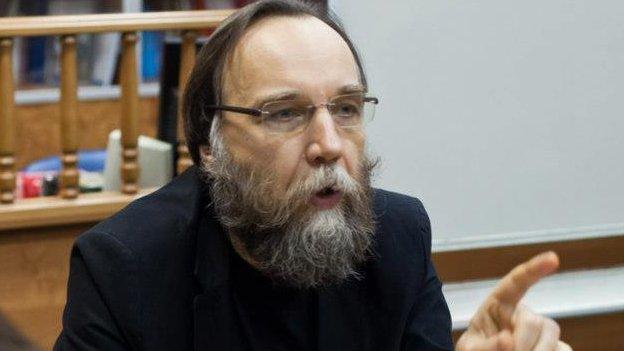
- Published10 July 2014
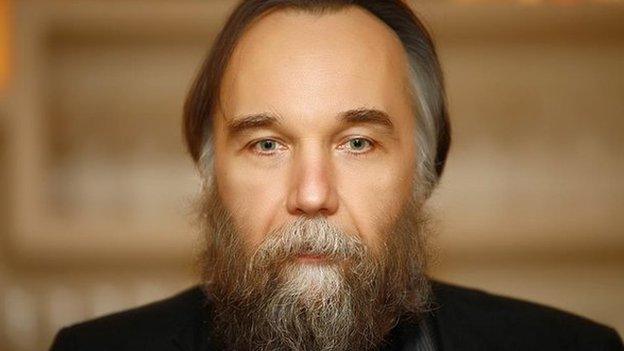
- Published22 August 2022
